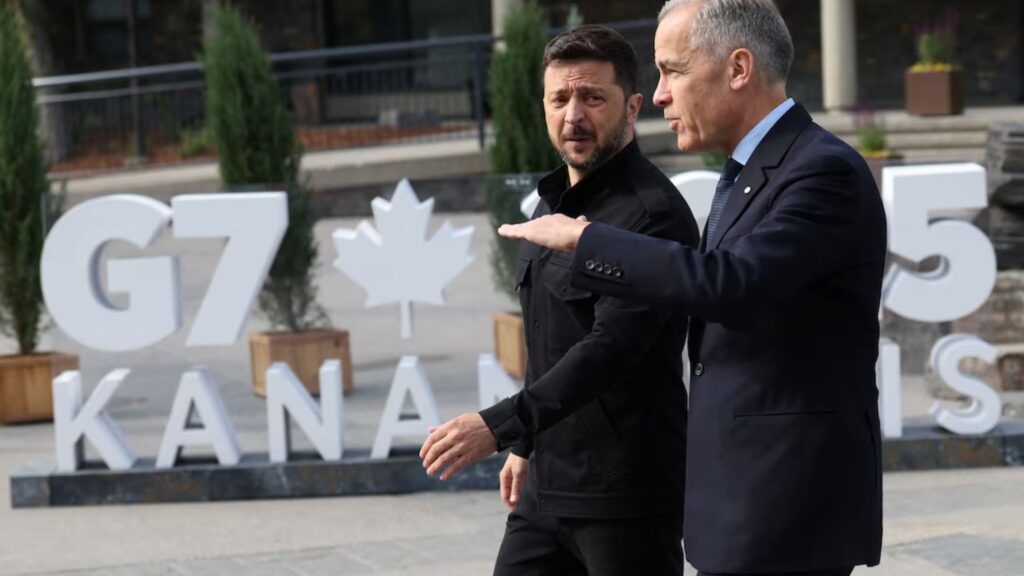Ukrainian President Volodymyr Zelenskiy concluded his participation in the Group of Seven (G7) summit on Tuesday with fresh military aid from Canada but without a unified statement of support from member nations, highlighting growing divisions over the war in Ukraine.
Canada, this year’s G7 host, pledged C$2 billion (approximately $1.47 billion USD) in new military assistance to Ukraine and announced additional financial sanctions against Russia. Prime Minister Mark Carney said the latest Russian missile attacks, which killed at least 18 people across Kyiv and other cities overnight, underscored the need for unwavering support for Ukraine.
“This brutal assault serves as a reminder of why total solidarity with Ukraine is necessary,” Carney said, speaking from the summit venue in the Rocky Mountains resort of Kananaskis.
Despite Canada’s firm backing, efforts to issue a collective G7 statement condemning Russia’s invasion faltered due to resistance from the United States. A Canadian official confirmed that plans for a strong joint declaration were abandoned following pushback from the U.S. delegation.
President Donald Trump, who departed the summit early to return to Washington amid rising tensions in the Middle East, did not meet with Zelenskiy as Kyiv had hoped. Trump cited the need for in-person National Security Council meetings related to the Iran-Israel conflict, although he denied French President Emmanuel Macron’s suggestion that his departure might indicate a pending ceasefire deal.
In his remarks to G7 leaders, Zelenskiy warned that diplomacy was “in a state of crisis” and urged them to press Trump to use his influence to help end the conflict with Russia. “Even if the American President is not applying maximum pressure right now, the reality is that the U.S. still holds the most global sway and has the most allies. That influence must be used for peace,” Zelenskiy posted on Telegram.
During a dinner meeting before Trump’s departure, leaders reportedly emphasized the need for increased pressure on Russia. Carney is expected to issue a chair’s statement at the close of the summit, urging further sanctions and reaffirming support for U.S.-led peace efforts. As the summit host, Canada can release such a statement without needing formal endorsement from other G7 members.
Trump’s stance on Russia remained controversial. Upon arrival, he reiterated his view that expelling Russia from the G8 in 2014 over the annexation of Crimea had been a mistake. The Kremlin welcomed his remarks and dismissed the G7 as “rather useless” for Russia today.
A European official said Trump appeared receptive to arguments for stronger action against Moscow, though he remained fundamentally skeptical of sanctions. Diplomats noted he showed interest in a Senate bill proposed by Republican Senator Lindsey Graham that could increase pressure on the Kremlin, but no commitments were made.
German Chancellor Friedrich Merz expressed cautious optimism. “I return to Berlin with hope that the U.S. will take additional steps in the coming days to increase sanctions on Russia,” he said.
Although Zelenskiy did not secure a meeting with Trump or new American aid commitments, Canada’s substantial assistance underscores its ongoing support for Kyiv. Still, Canada’s contributions remain limited in scale compared to the United States, Ukraine’s largest arms provider.
Beyond Ukraine, the summit produced six thematic statements on issues including artificial intelligence, critical minerals, wildfires, quantum computing, transnational repression, and migrant smuggling. A separate joint declaration condemned Iran as the primary driver of instability in the Middle East and affirmed Israel’s right to self-defense.
As part of efforts to broaden global partnerships, Carney also invited leaders from non-G7 countries including India, Mexico, South Korea, Australia, Brazil, and South Africa. Notably, Indian Prime Minister Narendra Modi was warmly received, signaling a thaw in diplomatic relations between Ottawa and New Delhi after years of strain.
While some G7 nations had hoped to finalize additional trade agreements, only a previously announced U.S.-UK trade deal was formally signed. Treasury Secretary Scott Bessent remained behind to represent Washington following Trump’s early departure.

